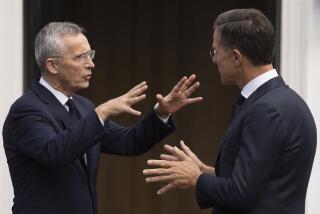New Balkan Mediator Sees Little Hope : War: Former Swedish leader says at European Union summit that violence in the region will probably escalate.
- Share via
CANNES, France — In unusually blunt language, Europe’s new mediator for the crisis in the Balkans admitted Tuesday that his chances for crafting a diplomatic settlement there were slim, then predicted that the 3-year-old war in Bosnia-Herzegovina may escalate.
“We are more likely to head for war than for peace in the immediate period ahead” in Bosnia, former Swedish Prime Minister Carl Bildt told reporters at a summit of the 15 European Union states, adding that a negotiated settlement was only possible if the international community supported just one peace plan. “We might not have much of a chance anyway, but we can only move ahead if we are united.”
His remarks came after a briefing of EU leaders on the crisis during a working dinner Monday night.
Bildt earlier this month replaced Lord Owen, a former British foreign secretary, as the EU’s Balkan mediator.
After giving Bildt his first negotiating mandate in the former Yugoslav federation, EU leaders Tuesday also acted on other fronts, including rededicating themselves to the lofty but technically difficult task of creating a single European currency by 1999 and agreeing to a formal accord on the new European police agency, Europol.
Bildt departs today on a new round of diplomacy that will take him first to Madrid to consult with officials from the Spanish government, which takes over the EU’s six-month rotating presidency next week, then to Geneva for meetings with representatives of the five-nation Contact Group, made up of the United States, Russia, Britain, France and Germany.
He is scheduled to return to the Balkans on Friday.
The Swedish statesman was equally pessimistic about conditions in Croatia, where many believe that government forces are preparing new action against Serb-held regions of the country.
“Clearly there is a drift toward greater military confrontation in Croatia,” Bildt said.
He said he hoped to meet next week with Croatian President Franjo Tudjman. With thinly concealed bitterness, Bildt noted that the Croatian leader had not been available during his first visit to the region because he had been on a sailing holiday off the New Zealand coast.
His comments to reporters came amid intensified fighting in the region as a Bosnian government offensive to break the siege of Sarajevo continued, and Serbs shelled the Bosnian capital in retaliation, killing one boy and wounding 17 other people Tuesday.
As for Bildt, other than his candor and proven diplomatic skills, he brings little new with him on his mission.
A five-point diplomatic initiative for the Balkans, unveiled at a late-night news conference here Monday by French President Jacques Chirac, offers little more than a European wish list; a peace plan proposed by the Contact Group has been rejected by the Bosnian Serbs for nearly a year.
“There’s nothing really that points to a possible success,” Bildt acknowledged of his prospects for finding a Balkan peace. “But we have a duty as Europeans to do our utmost to achieve something, however slim the chances might be.”
Bildt welcomed news reports that U.S. congressional Republicans have not been able to push through a unilateral lifting of a United Nations-imposed arms embargo against Bosnia, which critics say most harms the generally less-well-armed Muslim-led Bosnian government.
“I hope these reports are true, because it [lifting the embargo] would definitely have a very detrimental effect on the peace process,” he said.
At their summit here, the EU leaders coupled Bildt’s mandate with a declaration demanding a cease-fire and freedom of movement for U.N. peacekeepers attempting to deliver humanitarian aid to the war-torn region.
On other issues, the summit leaders mustered a new resolve to meet a January, 1999, deadline to launch a single European currency.
They also forged a compromise agreement to give Europol, the fledgling European law enforcement agency, a broader legal base.
More to Read
Sign up for Essential California
The most important California stories and recommendations in your inbox every morning.
You may occasionally receive promotional content from the Los Angeles Times.













